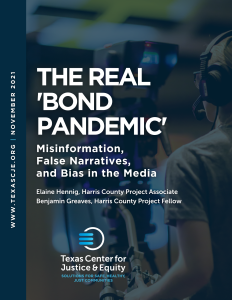
This week, TCJE released a report I co-authored on media bias in local TV stations’ coverage of bond reform. When I first began working on this project, I wasn’t sure what to expect. Attempting to methodically analyze media coverage was a daunting task, and many key details needed to be defined. Which forms of media would we analyze? How would we determine bias? Which articles should be included or excluded?
Over several weeks, these questions and many others were answered as the team and I collected articles from the six main Houston-area television stations. With the work of a dedicated group of coders, each of the 226 articles underwent a content analysis that focused on variables ranging from sources and indicators of bias to the race and alleged offenses of individual defendants.
Some of the trends we discovered, like the high levels of negative bias toward bond reform, fell in line with our initial expectations, while others, like the variations in bias between stations, were surprising. Overall, a consistent trend for most stations was that their problematic coverage of bond reform stemmed from their reliance on the same group of referenced sources: officials from law enforcement and their affiliates, the Harris County District Attorney’s Office, and Crime Stoppers of Houston, a local organization that’s frequently quoted in coverage and receives funds from court costs, including “court rewards.” Moreover, many claims from these sources went—and continue to go—unchallenged by the media, resulting in misleading narratives about bail reform that are reported across the majority of news stations.
Like so many other residents of the Houston area, I’ve used these TV channels as go-to sources of information for local news and advice. From hurricanes to the Astros, we rely on—and trust—the local news to provide accurate and balanced information. However, as revealed in our report, this is not always the case. The opinions of some groups receive more weight while others can even be left out entirely.
Although it’s imperative for the media itself to acknowledge these particular issues, our report also offers recommendations on how to improve practices and procedures for reporting more broadly on the criminal legal system. Hopefully, fellow viewers will also feel encouraged to reflect on whose narratives are being elevated in the media and if the stories presented to them are, in fact, the whole story.
UPDATE, November 2, 2021: Before releasing our report, we contacted the four English-language stations whose coverage we reviewed with a request for comment. Below are the questions we sent; we haven't received any responses yet, but we'll update if we do.
- Does your station have any policies to ensure that racial or ethnic groups are not disproportionately represented in your coverage of the justice system, in particular stories concerning bail bonds? If so, when was that policy implemented and is that policy presently being followed?
- Does your station have a policy on naming judges, attorneys, or other individuals associated with a criminal case in your coverage of the justice system, in particular stories concerning bail bonds? If so, when was that policy implemented and is that policy presently being followed?
- Does your station have a policy to ensure your coverage of the justice system distinguishes an arrest from a conviction in a criminal case? If your station has covered the arrest of an individual, is it your policy to publish a follow-up story if the charges are dismissed or the individual is found not guilty? Why or why not?
- Crime Stoppers Houston lists you as a partnering organization in their annual report. What is the nature of this partnership, and what activities (financial or otherwise) does this partnership entail? How much editorial control or influence does your station give to Crime Stoppers Houston?
UPDATE, December 2, 2021: In late November, we received an invitation from Houston's NBC affiliate to discuss this report. Co-author Elaine Hennig met with KPRC staff in early December to share our findings and recommendations.
